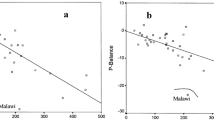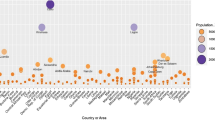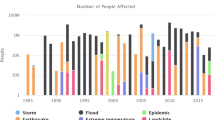Abstract
Climate change is recognised among the drivers of conflicts in developing regions but the growing studies on climate change–violent conflict nexus in Africa have paid little attention to the spatial dimension of the farmer–herder conflict in Nigeria. Existing studies have not explored the issue of climate change vulnerability regarding the farmer–herder conflict. Therefore, this paper contributes to the literature by examining the spatial dimension of the relationship between climate change and farmer–herder conflict vulnerabilities in Nigeria. Data were obtained from various secondary sources and the analyses were based on climate security vulnerability model. The study shows that the farmer–herder conflict is widespread across Nigeria but with significant spatial clustering and the hotspot is in the Middle Belt, especially in Benue State. The result of the regression model indicates that climate change vulnerability is the best predictor of the farmer–herder conflict in Nigeria but the effect is negative. This result implies that regions more vulnerability to climate change experience lesser farmer–herder conflict. The paper demonstrates that climate change could influence herders’ migration pattern as the herders now move southward due to deteriorating environmental conditions partly caused by changing climate in the northern regions. Thus, it argues climate change is not necessarily the cause of the conflict because the change in the pattern of herder’s migration does not automatically lead to climate change causing conflict. Migration is important but the mechanism establishing the migration–conflict nexus has to be explained by taking cognisance of identity differentials between herding groups and local communities.




Similar content being viewed by others
Availability of data and material
The data used were published by Nigeria Watch database, National Bureau of Statistics, Federal Ministry of Agriculture and Rural Development Collaborative Survey on National Agriculture Sample Survey (NASS).
References
Abugu, S. O., & Onuba, C. O. (2015). Climate change and pastoral conflicts in the middle belt and south-east Nigeria: Implication on human resource of the regions. Global Journal of Human Resource Management, 3(5), 44–51.
Adams, C., Tobias, I. T., Barnett, J., & Detges, A. (2018). Sampling bias in climate–conflict research. Nature Climate Change, 8, 200–203.
Ajaero, C. K., Mozie, A. T., Okeke, I. C., Okpanachi, J. P., & Onyishi, C. (2015). The drought–migration nexus: Implications for socio-ecological conflicts in Nigeria. Mediterranean Journal of Social Sciences, 6(2 S1), 470.
Akov, E. T. (2017). The resource-conflict debate revisited: Untangling the case of farmer–herdsman clashes in the North Central region of Nigeria. African Security Review, 26(3), 288–307.
Bassett, T. J. (1988). The political ecology of peasant–herder conflicts in the northern Ivory Coast. Annals of the Association of American Geographers, 78(3), 453–472.
Benjaminsen, T. A., Alinon, K., Buhaug, H., & Buseth, J. T. (2012). Does climate change drive land-use conflicts in the Sahel? Journal of Peace Research, 49(1), 97–111.
Benjaminsen, T. A., & Ba, B. (2009). Farmer–herder conflicts, pastoral marginalisation and corruption: A case study from the inland Niger delta of Mali. Geographical Journal, 175(1), 71–81.
Benjaminsen, T. A., & Ba, B. (2019). Why do pastoralists in Mali join jihadist groups? A political ecological explanation. The Journal of Peasant Studies, 46(1), 1–20.
Benjaminsen, T. A., Maganga, F. P., & Abdallah, J. M. (2009). The Kilosa killings: Political ecology of a farmer–herder conflict in Tanzania. Development and Change, 40(3), 423–445.
Buhaug, H. (2010). Climate not to blame for African civil wars. Proceedings of the National Academy of Sciences, 107(38), 16477–16482.
Buhaug, H., Gleditsch, N. P., & Theisen, O. M. (2010). Implications of climate change for armed conflict. In Social dimensions of climate change: Equity and vulnerability in a warming world (pp. 75–101).
Bukari, K. N., & Schareika, N. (2015). Stereotypes, prejudices and exclusion of Fulani pastoralists in Ghana. Pastoralism, 5(1), 20.
Busby, J. Smith, T. G. Krishnan, N., & Bekalo M. (2013). Climate security vulnerability model, version 3.0: Methodology. Climate Change and African Political Stability. The Roberts S Strauss Center for International security and Law.
Cabot, C. (Ed.). (2017). Climate change and farmer–herder conflicts in West Africa. In Climate change, security risks and conflict reduction in Africa (pp. 11–44). Berlin, Heidelberg: Springer.
Collier, P., Elliot, L., Hegre, H., Hoeffler, A., Reynal-Querol, M., & Sambanis, N. (2003). Breaking the conflict trap: Civil war and development policy. Oxford: Oxford University Press.
Dimelu, M. U., Salifu, E. D., & Igbokwe, E. M. (2016). Resource use conflict in agrarian communities, management and challenges: A case of farmer–herdsmen conflict in Kogi State, Nigeria. Journal of Rural Studies, 46, 147–154.
Federal Ministry for Economic Cooperation and Development (BMZ), Special unit ‘Climate’. (2014). The Vulnerability Sourcebook Concept and guidelines for standardized vulnerability assessments. BMZ Bonn
Fjelde, H., & Østby, G. (2010). Economic inequality and non-state conflicts in Africa. Paper presented at the 2010 Annual Meeting of the American Political Science Association, Washington.
Fjelde, H., & von Uexkull, N. (2012). Climate triggers: Rainfall anomalies, vulnerability and communal conflict in sub-Saharan Africa. Political Geography, 31(7), 444–453.
Folami, O., & Folami, A. (2013). Climate change and inter-ethnic conflict in Nigeria. Peace Review: A Journal of Social Studies, 25(1), 104–111.
Fotheringham, A. S., Brunsdon, C., & Charlton, M. (2003). Geographically weighted regression: the analysis of spatially varying relationships. London: Wiley.
Federal Ministry of Agriculture and Rural Development. (2012). Collaborative survey on national agricultural sample survey (NASS), draft report (pp. 35–98). Abuja: Nigeria Bureau of Statistics.
Getis, A. (2007). Reflections on spatial autocorrelation. Regional Science and Urban Economics, 37(4), 491–496.
Gleditsch, N. P. (2012). Whither the weather? Climate change and conflict. Journal of Peace Research, 49(1), 3–9.
Gurr, T. R. (1993). Why minorities rebel: A global analysis of communal mobilization and conflict since 1945. International Political Science Review, 14, 161–201.
Hendrix, C. S., & Glaser, S. M. (2007). Trends and triggers: Climate, climate change and civil conflict in Sub-Saharan Africa. Political Geography, 26(6), 695–715.
Hendrix, C. S., & Salehyan, I. (2012). Climate change, rainfall, and social conflict in Africa. Journal of Peace Research, 49(1), 35–50.
Herrero, S. T. (2006). Desertification and environmental security. The case of conflicts between farmers and herders in the arid environments of the Sahel. In W. G. Kepner, J. L. Rubio, D. A. Mouat, & F. Pedrazzini (Eds.), Desertification in the Mediterranean region. A security issue (pp. 109–132). Dordrecht: Springer.
Higazi, A. (2016). Farmer–pastoralist conflicts on the Jos Plateau, central Nigeria: Security responses of local vigilantes and the Nigerian state. Conflict, Security & Development, 16(4), 365–385.
Hoffmann, I. (2004). Access to land and water in the Zamfara Reserve. A case study for the management of common property resources in pastoral areas of West Africa. Human Ecology, 32(1), 77–105.
Hsiang, S. M., Burke, M., & Miguel, E. (2013). Quantifying the influence of climate on human conflict. Science, 341(6151), 1235367.
IPCC. (2007). Summary for policy-makers. In: Parry, M. L., Canziani, O. F., Palutikof, J. P., van der Linden, P. J. & Hanson, C. E. (Eds.), Climate change 2007: Impacts, adaptation and vulnerability: Contribution of working group II to the fourth assessment report of the intergovernmental panel on climate change (SAR) (pp. 7–22). Cambridge, New York: Cambridge University Press. https://www.ipcc.ch/publications_and_data/ar4/wg2/en/contents.html.. February 01, 2011.
IPCC, Porter, J. R., Xie, L., Challinor, A. J., Cochrane, K., Howden, S. M., Iqbal, M. M., et al. (2014). Food security and food production systems. In Field, C. B., Barros, V. R., Dokken, D. J., Mach, K. J., & Mastrandrea, M. D., et al. (Eds.), Climate change 2014: Impacts, adaptation, and vulnerability. Part A: global and sectoral aspects. Contribution of working group II to the fifth assessment report of the intergovernmental panel on climate change (pp. 485–533). Cambridge, New York: Cambridge University Press. https://ipcc-wg2.gov/AR5/images/uploads/WGIIAR5-Chap7_FINAL.pdf October 19, 2014.
Kahl, C. H. (1998). Population growth, environmental degradation, and states sponsored violence: The case of Kenya, 1991e93. International Security, 23, 80–119.
Kinsella, C., McTague, C., & Raleigh, K. N. (2015). Unmasking geographic polarization and clustering: A micro-scalar analysis of partisan voting behavior. Applied Geography, 62, 404–419.
Kuusaana, E. D., & Bukari, K. N. (2015). Land conflicts between smallholders and Fulani pastoralists in Ghana: Evidence from the Asante Akim North District (AAND). Journal of Rural Studies, 42(2), 52–62.
Levy, B. S., Sidel, V. W., & Patz, J. A. (2017). Climate change and collective violence. Annual Review of Public Health, 38, 241–257.
Madu, I. A. (2016). Rurality and climate change vulnerability in Nigeria: Assessment towards evidence based even rural development policy. Being a paper presented at the 2016 Berlin Conference on Global Environmental Change, Held from 23–24 May 2016 at Freie Universität Berlin.
Madu, I. A. (2018). Spatial vulnerability to Climate Change induced farmer–herder conflicts in rural Nigeria: Assessment towards evidence based adaptation policy. In 5th international climate change adaptation conference held at the international conference Cape Town South Africa 18–21 June 2018.
Maiangwa, B. (2017). “Conflicting indigeneity” and farmer–herder conflicts in postcolonial Africa. Peace Review, 29(3), 282–288.
Moritz, M. (2006a). The politics of permanent conflict: Farmer–herder conflicts in Northern Cameroon. Canadian Journal of African Studies, 40(1), 101–126.
Moritz, M. (2006b). Changing contexts and dynamics of farmer–herder conflicts across West Africa. Canadian Journal of African Studies, 40(1), 1–40.
National Bureau of Statistics. (2017). Annual abstract of statistics. Abuja, Nigeria.
Nigeria Watch. (2018). Nigeria Watch: Eighth report on violence. http://www.nigeriawatch.org/media/html/NGA-Watch-Report18V4.pdf.
Nonye, O. B., & Iwuoha, V. C. (2015). New dimensions to pastoralists–farmers conflicts and sustainable agricultural development in Agadama and Uwheru Communities Niger Delta. African Security, 8(3), 166–184.
Nordås, R., & Gleditsch, N. P. (2007). Climate change and conflict. Political Geography, 26(6), 627–638.
Nordås, R., & Gleditsch, N. P. (2013). The IPCC, human security, and the climate–conflict nexus. In M. Redclift & M. Grasso (Eds.), Handbook on climate change and human security (pp. 67–88). Cheltenham: Edward Elgar Publishing.
Nwankwo, C. F. (2018a). The battles for supremacy and agenda-setting: Representations of the farmers–herders conflict in Nigerian newspapers. Unpublished MA dissertation, Keele University, UK. https://doi.org/10.13140/rg.2.2.19585.92007.
Nwankwo, C. F. (2018b). Critical geopolitics of the farmers–pastoralists conflict in Nigeria. In A paper presented at the 1st Africanity Scholars Network International Conference [Knowledge loss, bondage and regrets in post-contact societies] at University of Nigeria, Nsukka, Nigeria. December 8–10, 2018.
Nwankwo, C. F. (2019a). Essentialising critical geopolitics of the farmers–pastoralists conflicts in West Africa. GeoJournal. https://doi.org/10.1007/s10708-019-10023-3.
Nwankwo, C. F. (2019b). The spatial pattern of voter choice homogeneity in the Nigerian presidential elections of the fourth republic. Bulletin of Geography. Socio-economic Series, 43(43), 143–165.
Nwankwo, C. F., Ayadiuno, R. U., Ali, A. N., & Madu, I. A. (2020). Farmer–herder conflict: the politics of media discourse in Nigeria. Ponte, 76(1), 191–221.
Obioha, E. E. (2008). Climate change, population drift and violent conflict over land resources in northeastern Nigeria. Journal of Human Ecology, 23(4), 311–324.
Odo, S. I., & Chilaka, F. C. (2012). Climate change and conflict in Nigeria: A theoretical and empirical examination of the worsening incidence of conflict between Fulani herdsmen and farmers in Northern Nigeria. Arabian Journal of Business and Management Review, 2(1), 110–124.
Office for the Coordination of Humanitarian Affairs OCHA. (2016). Understanding the climate–conflict nexus from a humanitarian perspective: A new quantitative approach. OCHA Policy and Studies Series, Occasional Paper 2016/2017
Olaniyan, A., & Okeke-Uzodike, U. (2015). Desperate guests, unwilling hosts: Climate change-induced migration and farmer–herder conflicts in southwestern Nigeria. Conflict Studies Quarterly, 10, 23–40.
O’Loughlin, J., Witmer, F. D., Linke, A. M., Laing, A., Gettelman, A., & Dudhia, J. (2012). Climate variability and conflict risk in East Africa, 1990–2009. Proceedings of the National Academy of Sciences, 109(45), 18344–18349.
Onuoha, F. C., & Ezirim, G. E. (2010). Climate change and national security: Exploring the conceptual and empirical connections in Nigeria. Journal of Sustainable Development in Africa, 12(4), 255–269.
Raleigh, C. (2010). Political marginalization, climate change, and conflict in African Sahel states. International Studies Review, 12, 69–86.
Raleigh, C., & Urdal, H. (2007). Climate change, environmental degradation and armed conflict. Political geography, 26(6), 674–694.
Sabates-Wheeler, R., Devereux, S., Mitchell, T., Tanner, T., Davies, M., & Leavy, J. (2008). Rural disaster risk-poverty interface. A report prepared for the global assessment report on disaster reduction. Institute of Development Studies, University of Sussex, United Kingdom.
Sachs, J. (2005). The end of poverty: Economic possibilities for our time. New York: Penguin.
Schilling, J., Freier, K. P., Hertig, E., & Scheffran, J. (2012). Climate change, vulnerability and adaptation in North Africa with focus on Morocco. Agriculture, Ecosystems & Environment, 156, 12–26.
Serdeczny, O., Adams, S., Baarsch, F., Coumou, D., Robinson, A., Hare, W., et al. (2017). Climate change impacts in Sub-Saharan Africa: from physical changes to their social repercussions. Regional Environmental Change, 17(6), 1585–1600.
Shin, M. E., & Agnew, J. (2007). The geographical dynamics of Italian electoral change, 1987–2001. Electoral Studies, 26(2), 287–302.
SIDA. (2018). The relationship between climate change and violent conflict. Green tool box/peace and security tool box: working paper, 2017.
Theisen, O. M., Holtermann, H., & Buhaug, H. (2012). Climate wars? Assessing the claim that drought breeds conflict. International Security, 36(3), 79–106.
Turner, M. D. (2004). Political ecology and the moral dimensions of “resource conflicts”: The case of farmer–herder conflicts in the Sahel. Political Geography, 23(7), 863–889.
Ubelejit, N. T. (2016). Fulani herdsmen and communal conflicts: Climate change as precipitator. Journal of Political Science and Leadership Research, 2(1), 26–32.
Wischnath, G., & Buhaug, H. (2014). On climate variability and civil war in Asia. Climatic Change, 122(4), 709–721.
Funding
No funding was received for this research.
Author information
Authors and Affiliations
Contributions
The paper was written jointly by the authors listed on the manuscript.
Corresponding author
Ethics declarations
Conflict of interest
The author(s) declare no conflict of interest.
Code availability
No codes were used for the analysis.
Additional information
Publisher's Note
Springer Nature remains neutral with regard to jurisdictional claims in published maps and institutional affiliations.
Rights and permissions
About this article
Cite this article
Madu, I.A., Nwankwo, C.F. Spatial pattern of climate change and farmer–herder conflict vulnerabilities in Nigeria. GeoJournal 86, 2691–2707 (2021). https://doi.org/10.1007/s10708-020-10223-2
Published:
Issue Date:
DOI: https://doi.org/10.1007/s10708-020-10223-2




